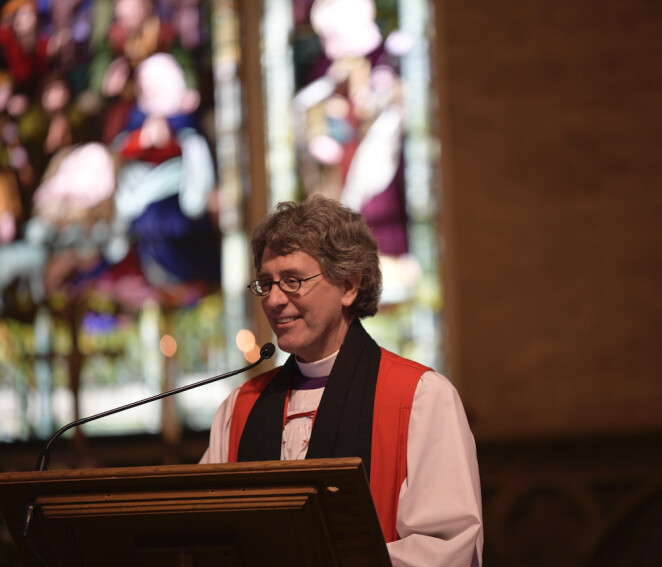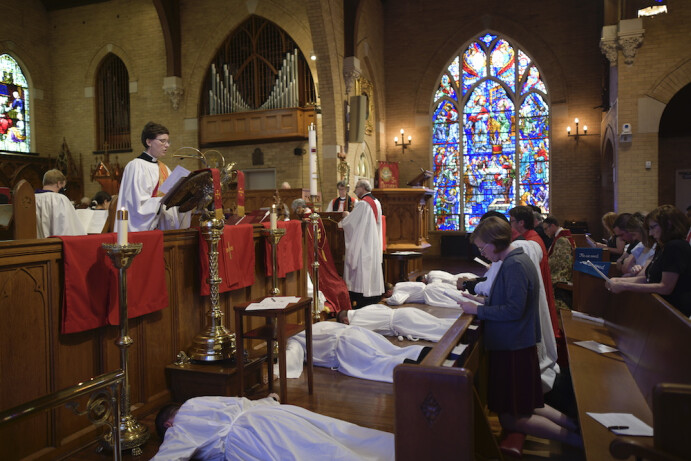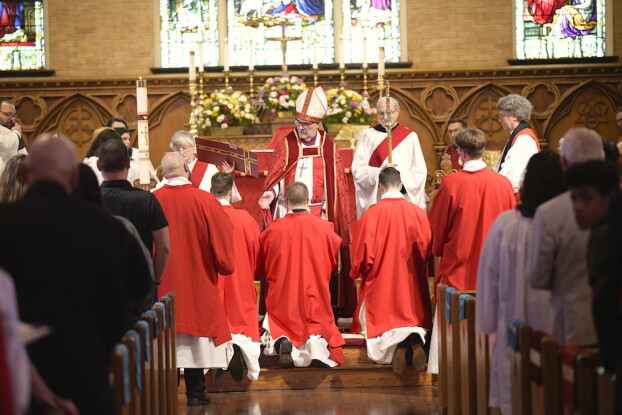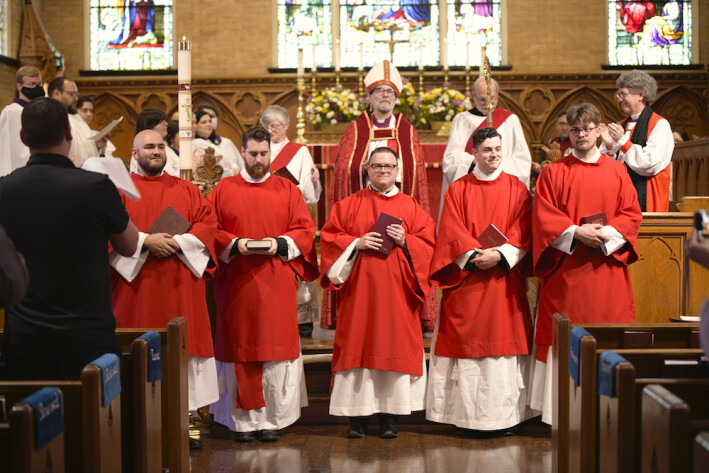Ordination Sermon by the Rt. Rev. Dr. Stephen Andrews

For we preach not ourselves, but Christ Jesus as Lord; and ourselves as your servants for Jesus’ sake.
2 Corinthians 4.5
In 1995, the late Secretary General of the Church Mission Society, Canon Diana Witts, enthusiastically recounted what was being described in the Anglican Church as ‘reverse mission’. She explained how the Anglican Church in the Majority World was beginning to send missionaries to Britain, and she told the story of a mission partner from Nigeria who landed at London Heathrow and then had to make sense of Customs. There he was confronted with two unfamiliar channels: one was the Red channel, subtitled ‘something to declare’; and the other the Green channel, where one would go who had ‘nothing to declare’. He thought to himself, ‘I have something to declare’. And when the Red channel customs official asked what he had to declare, he opened his Bible and said, ‘I have come to declare Christ crucified and myself as your servant for the sake of the gospel!’ (2 Cor 4.5).[1]
I want to begin my sermon this morning by expressing my gratitude to your bishop for the invitation to preach to you on this important occasion. It is a joy for me to be with you, on behalf of Wycliffe College – to celebrate with your families and this diocese the addition of five young, talented and passionate leaders for Christ’s Church in this place, and to be a prayerful witness in this stage of the fulfilment of the vocation God has given you.
And yet, there is something of the naivety of our Nigerian missionary that characterises this moment. God has given you a vision and a purpose: ‘to make Christ and his redemptive love known, by your word and example, to those among whom you live, and work, and worship’ as the Ordinal says (p. 543). You have something life-giving to declare. And by the resolutions of the Parish Committee on Vocations, the Commission on Ministry, and the confidence of your own bishop in this matter, you are now being commissioned to undertake the responsibilities of leadership in this Church.
But I confess that I have some misgivings. This is not a reflection of your suitability for this ministry. Of course, you are unsuitable. We all are. But this has been a difficult season for church leaders. Some have given in to the temptation to abuse their influence and power, and their congregations, families, and the reputation of the Church have been harmed. Others wonder if they shall ever recover from the extraordinary challenges of ministry during the pandemic, and they are thinking of getting out of the business altogether because they are whipped. I want you to know that we are all grateful for your eagerness to spend yourself in the service of Christ’s flock, but we worry about the state of your souls, maybe in as little as five years’ time. We should be heart-broken if you discovered, as our Nigerian friend might have done, that you had misunderstood the signs, thinking that your charges were eager to hear your message, only to discover that they were more interested in looking through your baggage.

If you will indulge me, I would like to offer some reflections on what it means to be a deacon in today’s Church. I hope that what I have to say will underscore the gravity of what you are about to undertake, while at the same time offer some encouragement.
Let me begin by saying something about what being a deacon is not. Being a deacon is not a job. There will be those, even in the church, who imagine that the deacon is just one of the many staff positions that make a parish work. The deacon is a kind of pastor-in-training, an assistant vicar who takes his or her place beside the wardens, the treasurer and the youth group leader, and who usually reports to the parish secretary.
This is wrong-headed for a variety of reasons. First of all, the diaconate is a calling and not an occupation. It is sometimes a challenge to get lay people to understand that, properly speaking, clergy are not paid salaries, but stipends. A salary is a reward for work accomplished. In the Church, however, God’s servants do not labour for such rewards. They have not chosen this line of work so that they can provide for their families and have a prosperous retirement. Rather, the Church, recognising their calling, undertakes to look after the temporal needs of the cleric and his or her family, so that she or he may be freed from material cares and devote themselves to the spiritual service to which God has called them. So the diaconate is not a job.
Secondly, while jobs are evaluated on the basis of performance reviews, the Bible pays more attention to the character of the minister than his or her performance. This is partly what makes it so hard to come up with a biblical definition of the deacon’s role in the Church. It would be a lot easier if Scripture was clear about the deacon having to lead the youth group, make sure that the bishop gets a gin and tonic in the afternoon, and preach on Trinity Sunday.
In reality, there are few clear references to deacons in the New Testament. The most comprehensive description is found in 1 Timothy 3, and there it says that a deacon must ‘be grave, not double-tongued, not given to much wine, not greedy of filthy lucre’ (v.8), blameless (v. 10), and respectable managers of their families (v. 12). And the compensation is stipulated there, too. Faithful deacons ‘purchase to themselves a good (reputation), and great boldness in the faith which is in Christ Jesus’ (v. 13).
In this morning’s Ordinal, you will see that before we come to the part about the deacon’s duties, it has to be established that you are loyal and obedient, and determined ‘to conform to the doctrine, discipline, and worship of the Episcopal Church’ (p. 538). This is because the effectiveness of diaconal ministry depends primarily on what kind of person the deacon is.

Finally, the diaconate is not a stage one goes through to reach a higher echelon of ministry. It is not a stepping stone or proving ground for the priesthood or the episcopacy. Once a deacon, always a deacon. And for this reason we must resist the common practice of qualifying the term ‘deacon’ with the adjective, ‘transitional’. No one here is being made a ‘transitional deacon’. The diaconate is permanent and an end in itself, and if there is any transition that is meant to happen, it is in the transformation of our self-preoccupied and self-serving inclinations into instincts and habits directed towards the service of others.
For having said what the diaconate is not – it is not a job, it is not performance-based, and it is not a ladder on the rung of ecclesiastical success – we come to the nub of what the diaconate is: it is the life of service.
Now while the Bible does not describe an institutionalized diaconate, it does teach that diaconal ministry is at the heart of the Church’s very being, and the reason for this is that deacons are emblematic of service. The Greek noun, διάκονος, means ‘servant’.
And here is the important point: in making the five of you deacons this morning, the bishop is setting you out as examples of what the Church itself is called to be. Your vocation is to show us what it means to serve. Indeed, this is vitally important for those of us who are also ordained to remember, for we bishops and priests remain deacons. Without the diaconate, the priesthood and episcopacy themselves cease to be Christ-like ministries.[2] For if we should be like Christ, we must become like him who said, ‘I am among you as one who serves’ (Lk 22.27).
Diaconal ministry is service. But it is service with Christ in the ministry of others. And this means that leadership in the Church is very different from leadership in the world. One of the common features in all of the stories of disgraced ministers, in what may be regarded as a season of ecclesiastical scandal, is that leaders have failed to live up to their diaconal call. The leader’s calling is to be a servant, not dictator, a slave, not a master. True, a certain authority comes with all leadership. The apostles were given authority by Jesus to preach and heal in his name, and in a few moments you will receive Bibles as ‘the sign of your authority to proclaim God’s Word and to assist in the ministration of his holy Sacraments’ (p. 545). Yet, Jesus’ emphasis was not on the authority of the ruler, but the on humility of the servant. Service for Jesus was not a means to an end, it is the reason he came into the world. The New Testament scholar T.W. Manson wrote, ‘In the Kingdom of God service is not a stepping-stone to nobility: it is nobility, the only kind of nobility that is recognised.’[3]
My friends, the strongest churches are not those with the strongest leaders. The strongest churches are those with the most devoted servants – leaders who serve not their own interests, but the interests of others, neither exploiting nor manipulating them, but promoting the dignity and respect that is due them as creatures made in God’s image.
In its deepest expression, service may be understood as the incarnation of divine love, and, as we are about to be reminded in the drama of the Eucharist, divine love is costly. Indeed, the great missiologist, Samuel Zwemer, noted that it was Jesus’ scars which enabled his disciples to recognise him after his resurrection.
The ministry of the Deacon, in emulating the servanthood of Christ, brings its own scars. You will experience frustration and disappointment in your ministry. You will have your strength spent and your heart broken. But these are the wounds of love. But as with the martyrs, suggests St Augustine, these will not be seen as injuries or deformities, but as ‘honours’.[4]

David, Ian, Gavin, Jacob and Nathan, as you now join Jesus in putting on the apron of servitude; as you prepare to get down on your hands and knees to wash feet, may God grant you humility, and may your service be received as marks of honour, both for yourselves and for our Lord.
Preached on the occasion of the ordination to the diaconate of:
David Leo Beadle
Ian Geoffrey Hyde
Gavin Edward McAdam
Jacob Robert Nichols
Nathan John Webb
St Matthew’s Cathedral, Dallas
[1] Diana Witts, Secretary General of C.M.S., at the Global Conference on Dynamic Evangelism beyond 2000: Mid-point Review of the Decade of Evangelism (4 to 9 September 1995, at the Kanuga Conference Center, Hendersonville, North Carolina, USA).
[2] Jesus is himself called a ‘deacon’ in Romans 15.8.
[3] The Church’s Ministry (London, 1948), p. 27.
[4] City of God, 22.20.

